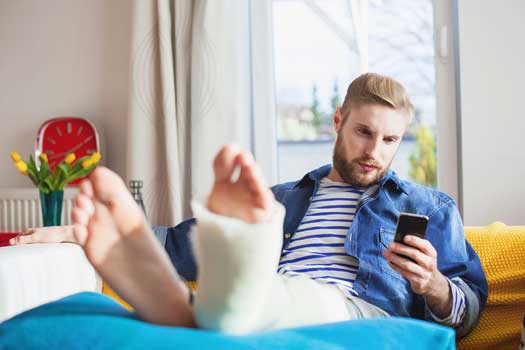
In today’s digital age, social media platforms have become intertwined with our daily lives. From sharing personal milestones to voicing opinions, social media is a powerful tool for personal expression. However, for those embroiled in personal injury cases, the ramifications of social media can be both profound and far-reaching. Legal professionals must be adept at navigating these waters to ensure their clients’ best interests are protected. This blog post delves into the risks, benefits, safety measures, and best practices concerning social media and personal injury cases.
What are the Risks of Social Media Posts in Personal Injury Cases?
Compromising Claim Credibility
One of the most significant risks posed by social media in personal injury cases is the potential to compromise claim credibility. Insurers and opposing legal teams frequently scour social media profiles to gather evidence that can undermine the severity of injuries or the overall legitimacy of a claim.
Inconsistent Statements
Inconsistent or contradictory statements made on social media can provide the opposition with ammunition to challenge the plaintiff’s narrative. For example, posting about engaging in strenuous activities while claiming severe physical limitations can weaken the case.
Privacy Concerns
Even seemingly innocuous posts can be misinterpreted or taken out of context. Additionally, privacy settings are not foolproof. Information shared online can potentially be accessed and used against the claimant in court.
Prejudicial Evidence
Photos, comments, or shared content that might seem harmless can be used to paint the plaintiff in a negative light, potentially influencing the outcome of the case.
What are the Benefits of Using Social Media For Personal Injury?
Evidence Collection
While social media poses risks, it can also be a valuable tool for gathering evidence. For instance, posts from the defendant or witnesses can provide crucial insights or contradictory evidence that bolsters the plaintiff’s case.
Witness Location and Verification
Social media platforms can help locate potential witnesses and verify their backgrounds or statements. This can be particularly useful in building a robust case.
Community Support
Social media can also be a means of garnering moral support and solidarity from the community. Sharing experiences and connecting with others who have been through similar situations can provide emotional support and encouragement.
Awareness and Advocacy
Raising awareness about personal injury issues, advocating for better safety measures, and highlighting legal rights can also be effectively achieved through social media platforms.
How Do I Stay Safe Online In A Personal Injury Case?
Adjust Privacy Settings
Ensure that privacy settings on all social media accounts are set to the highest level. This can help control who sees your posts and limit unwanted access.
Avoid Discussing the Case
Refrain from discussing any details related to the case online. This includes direct mentions, indirect references, or sharing any information that could be tied back to the incident.
Limit Social Media Activity
As a precautionary measure, consider limiting overall social media activity until the case is resolved. This minimizes the risk of inadvertently posting something that could be detrimental to the case.
Be Mindful of Photo Tags
Photos in which you are tagged can still appear publicly, depending on the privacy settings of the person who posted them. Remove tags and request friends and family not to post images or updates that could be linked to you.
What are the Do’s and Don’ts of Social Media In Personal Injury Cases?
Do’s
- Consult Your Attorney: Always consult your attorney before posting anything that might relate to your case. They can provide guidance on what is safe to share.
- Regularly Review Privacy Settings: Regularly review and update privacy settings on all social media platforms to ensure maximum security.
- Monitor Friends and Family Posts: Politely ask friends and family to avoid posting about you or tagging you in posts while your case is ongoing.
- Document Findings: If you come across relevant information or evidence on social media, document it and share it with your attorney.
Don’ts
- Don’t Post About Your Accident or Injuries: Avoid sharing any details about the accident, your injuries, or the legal proceedings.
- Don’t Accept New Friend Requests: Be cautious about accepting new friend requests or connections, as they could be attempts to gain access to your information.
- Don’t Delete Existing Posts: Deleting posts can be seen as an attempt to destroy evidence. Always seek legal advice before taking such actions.
- Don’t Engage in Discussions About the Case: Avoid engaging in any discussions, debates, or comments about the case, even in private messages.
Understand the Impact of Social Media on Your Personal Injury Case
The intersection of social media and personal injury law presents both challenges and opportunities. For legal professionals, understanding the nuanced impact of social media on personal injury cases is paramount in providing effective representation. By recognizing the risks, leveraging the benefits, and adhering to best practices, attorneys can safeguard their clients’ interests and navigate the complexities of the digital landscape.
In conclusion, while social media is a powerful tool that connects us to the world, it must be used judiciously and strategically in the context of personal injury cases. If you or your client are involved in a personal injury case, always seek professional legal advice to navigate social media use carefully. This can mean the difference between a favorable and unfavorable outcome.
By staying informed and vigilant, legal professionals can harness the power of social media to advance their clients’ cases while minimizing risks.
Take proactive steps, be mindful of online activity, and never underestimate the importance of a well-crafted legal strategy in the age of social media.












